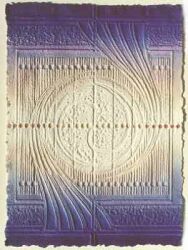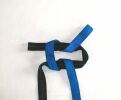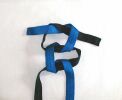TAT Forum
December 2001
![]()
Essays, poems, opinions and humor on seeking
and finding answers to your deepest life-questions
|
This month's contents: Chasms of the Mind by Richard Rose | Zen and Common Sense (part 1) by Richard Rose | Poems by Shawn Nevins | On the Value of Headlessness by Shawn Nevins | Living in Internal Harmony by Jim Burns | Nothing to be Done? by Bob Cergol | Knots upon Knots by Bob Fergeson | Seeking Self-Knowledge by Gary Harmon | Humor | Reader Commentary
|
Chasms of the Mind
by Richard Rose
A man named Porto dreamed of his father at least once a week. His father, Dr. Porto, had been dead for years, but in the dreams he conversed with his son and gave him detailed advice which the son tested and found very useful—and at times—accurate.
And Porto became an authority on dreams, and counselled many hundreds of people to practice dreaming. Porto became very famous because thousands of people found that they had no trouble dreaming. And Porto and all his followers were convinced that they had found a secret bridge across the chasm of death.
And Porto died and went to that which he thought was heaven. And he met that which he thought was his father. To test to determine if this was really his father, he asked Dr. Porto to corroborate some of the advice that Porto had received in his dreams.
And Dr. Porto replied that the only contact that he had with those he left behind were dreams, some vague, and some so real that he was convinced that he was communicating with children still on earth. But neither had any memory of the dreams which the other experienced.
In frustration Porto said to his father, "Are not all people in heaven capable of knowing that which goes on, on earth?"
And his father replied, "There are people here who believed that they lived before ... but others do not believe that this place exists."
~ First published in the TAT Journal No. 14. © 1986 by Richard Rose. All Rights Reserved. See the TAT Journal Archive page.
![]()
Zen & Common Sense (part 1)
by Richard Rose
~ From a 1974 talk given by Richard Rose
 Sometimes the people who have been in the group or who have been acquainted with us for
awhile—occasionally some of them will give up and say, "There's an objective here that
I don't think I can reach."
Sometimes the people who have been in the group or who have been acquainted with us for
awhile—occasionally some of them will give up and say, "There's an objective here that
I don't think I can reach."
And this may be true for a good many people. And sometimes the family of people who are associated with the group will say, "Hey...." Like one fellow from Pittsburgh—his father knew he joined and thought it was a good idea, because since he joined he hadn't been smoking pot. So he belonged for awhile, and finally the father said to the boy, "What are you doing down there?"
He said, "We're looking for the truth." And the father said, "Well, hurry up and find it, so you can tell a few people and then go back to work."
A lot of people pick it up after they read a little Zen literature—that there's an ultimate objective, of an ultimate knowledge. Not just a way of life, just a cult, in which you get together and harmonize with similar people. But there is an ultimate objective that when some people hear of it, it frightens them.
Because it involves—if you read some of the literature you can pick up a hint of it—it involves a change of being. A change of a person's perspective; an entirely new understanding of the universe. And a negation of possibly a tremendous lot of values that you functioned by previously.
And there's a double reaction to this. One is, first of all, that it's unattainable. And the second is, "If we don't attain it, what good is it? What good is it to lead a life or follow a system if you're not sure of making the whole trip and finding out the secret of everything?"
Now the answer to that is that there is common sense in Zen. And the longer that you follow the self-confrontation, the self-analysis, the better off you are to just live with yourself, and for other people to live with you. Because you drop a lot of the poses which you previously had, and which previously got you into trouble. And you take a new, broader view of things because your egos are not in the way, destroying your friendships, and destroying your family, your financial possibilities even.
But I maintain that Zen is worthwhile. Or I wouldn't have spent these years talking with no financial remuneration. And I think that it has two major advantages, for those who indulge in it. One is psychological, as I hinted before; you become a better person. And of course the other one is a spiritual realization.
And when we talk of spiritual things we talk of religion, philosophy, anything that brings you to the point of knowing who you are and knowing what your relationship is to the visible cosmos and the invisible possibilities of life after death.
And I note that other systems are lacking—or I wouldn't have gotten into Zen and I wouldn't advise Zen. And the psychological systems are lacking: because they search for what I call a packaged method of helping people become better animals in the herd, rather than people who have a knowledge of their own mind. This is the trend in modern psychology, or current psychology.
In religion of course, the thing for centuries has been to placate and pacify the masses with fable and fairy-tale and some promise of a happy hunting ground later—with no real realization of it. No real proof of it, let's say, or even a good understanding of such that might happen to you when you die.
So—what are we curious about? I maintain that everyone is searching for the truth. I've said this repeatedly. I don't believe—we classify people and we say the truth about the people they're living with—to know more about the personalities of those people and that sort of thing.
The steelworker wants to know how to put out better steel—the truth of mechanical processes—the mathematician wants to know of better mathematics, and the physicist wants to know more about the atom, which is a search for the truth in itself. And so on.
Everyone is curious. Some don't take the time. Some are defeated before they start by believing they're too small to find out. And I don't think this is the proper pose.
But regardless, the systems—which millions of people follow and build churches and monuments to—fail to provide the proper answers.
And we get into certain categories on this. We get into categories of people who advise you to believe: Just don't think, believe. And some or many of the people are convinced to just believe.
*
There are three major questions in life. And you can gauge any philosophy, ism, or movement by the way they answer these three questions. The first is: "Where did we come from?" The second is: "Who are we?" (Or—"What is life?") The third is: "Where are we going?"
Now this is the province of religion. It's also the province of philosophy, and "Who are we?" is the province of psychology. None of these questions, I maintain, are answered properly and with the common sense that would encourage people to stay with such a theory, religion, ism, or whatever.
Let us start off with the first one. For instance, what is yesterday? We look upon yesterday as that which is past, as something which is similar to the future, except that we have experienced it. The future we haven't experienced. And we look upon it as a time element we can measure.
Sure, with our radioactive instruments we can guess how many thousands of years a certain being existed on the planet, or something of that sort, or how old the planet is itself. And we get an idea of what I call retrograded time. But is it possible to really measure this time, when you get to thinking about it, in relation to what is the present?

What is the basis of everything I've just said, now in the past? The present is a split second, if there is such, that is here somewhere in between what I'm going to say and what I have said. Because as soon as I've spoken, it is past. So time becomes a portion of experience that is hardly estimable, in the fact that it can't be changed. It is.
We can only view the past as something that is unchangeable, and as a permanent type of experience. And in view of something that is unchangeable, without variation or motion, and that which is viewed the same by all—it is something that cannot be re-experienced or changed in experience form. It can be re-experienced in memory, but it cannot be changed. Whereas in looking forward, to that which we cannot see, we have an idea that we can change it. This is the eternal hope—of changing that which is rapidly becoming the past.
But regardless, we have no real knowledge of this relation in the past, relative to our space-time concept.
If we have an element called space-time, the past and the future must be pretty much be the same, being not necessarily a mobile experience, but just a viewing or an experiencing of something which already exists.
So—this is just a proposition. I'm not expounding or trying to convince you of a logical interpretation of space and time, but I'm just saying we don't know. We don't know actually, except for impressions we get. We get the idea for instance, that time, the past, has duration, and it has duration similar to the calendar and the clock.
This business of experiencing—when you look back upon the experience lots of time the thing that happened two weeks ago may be very dim in your mind, whereas something that happened ten years ago may be very clear. So as far as our experience of past events, perhaps the long-ness of time passing is determined by our interest in an incident, our attention to an incident, not necessarily the clock or the calendar.
What do you identify as now? If you'll look at the second that is now, we seem to hang continually in a thin thread of desperate realization, of what is rapidly being cemented into our eternal past, an immobile past—hoping in that one second of momentary consciousness to change the future. And the past moves up on it so rapidly, the future becomes the past so rapidly, that we really don't have much chance of changing our lives.
A lot of people think about the ability to have a will. That every human being has a will. That's a delightful thought, but with the rapidity with which one thought pushes us into another thought, one incident creates a condition that we have to live in.
We go back then to the next question and say, "What are we?" You know, "Who is here?" And of course, people very seldom stop to think about this. People are aware of the question, and you generally get a bit of sophistry in the answer: They'll say, "I'm the person that is sitting in front of you," or something of the sort.
But we know that there's a different meaning to this question. There's a book by J.J. van der Leeuw (Conquest of Illusion). Van der Leeuw says that very possibly we are or we could be, a point in space, the end of a ray, or something of that sort, but because of collective agreement we assume that things have a certain form. An agreed upon belief and form.
For instance, we know that our senses are limited, and that very much is agreed upon. We know that our retina receives things upside down in the eyeball and we adjust the picture. The chairs in this room that appear to us as blue, in the chemical analysis of the composition of color may really not be blue. Black is not black and white is not white, as we see it. It appears to us that way, but white is the accumulation of all the colors, and black is the absence of color. So white is every thing but what it looks like, supposedly. This is caused by the reflection of the different components of the light that strikes the prism.
So consequently—what I'm trying to get at is not to prove that white isn't white, but to say again that we have limited senses. Our eyeball has a limited retina; there are only so many rods in there. Hearing has a limited range. Some animals have a better range and pick up different things. And faculties, perhaps. Some animals seem to have faculties that we don't have. They talk of dogs or certain animals that pick up spirits in a haunted house. They pick up vibrations that we don't pick up.
So in other words—our world, as we know it, can only come to us through our senses. And if our senses are limited or twisted or inadequate, then this world may be entirely different from what it appears to us. And if we can by agreement agree upon a form—all of us agree together that a certain form exists—then it's possible that the whole picture can somehow be projected or agreed upon.
*
Are we just a bag of protoplasm? (I'm getting down to the body as we know it and put it in a test tube.) Are we more than a being with a bunch of conditioned reflexes? This is one of the psychological definitions of what we are.
Are we more than that? A sentient, as we like to think, self-directing entity that moves freely, willfully, and does things? And may we prepare ourselves, artfully, willfully, in this dimension—and even prepare for another dimension which we've postulated and believe in?
Are we anything more than a warm body? In other words, modern psychology is somewhat somatic—it tells us that we're basically what you see—a more or less protoplasmic reacting body.
We'd like to present ourselves, I think a good many would like to, saying, "Well, we're just here," this is our rationalization against action, "so let's take care of the body; let's have fun. Let's get along while we're having fun. Let's make a bit of money, or reproduce, or something of that sort. Because that's what we're going to be anyway in the final analysis, a record of experience. So let's have some experience."
Another thing is—if we get a particular slant on theology—we get the idea that this creature, this little warm body, is placed here by a very warm-hearted creature which we call God. And he loves us, and if we love each other—that's the rule we have to obey more than anything else—and if we love each other and create a tremendous atmosphere of love, then this God will come down some day, and tell us how much he loves us, and take us off to an eternal happy hunting ground.
But, we never stop to think that love is something we want. We're trying to impose a condition by preaching it. Very few people stop to analyze this thing we're talking about when we're talking about love. Mostly they want people to love them. This is the complaint; it isn't the idea of love of love, it's, "Love me."
~ Continued in the January 2002 TAT Forum
© 1974 Richard Rose. All Rights Reserved.
![]()
Poems by Shawn Nevins

|
My steps are not taken by me, * All around us dances life. * Do that which comes natural: * In quiet moments, * In Memory of Memories Lost—9/11/01 How is salvation found Within pain, longing, terror, and despair, For those who are left, a prayer: * Where is within? The sun shines on my memories Looking, asking, wanting, this haunting |
![]()
On the Value of Headlessness
by Shawn Nevins
Recently, a friend asked my opinion on the value of Douglas Harding's work. Specifically, how could a method relying on perception be an "experience" of the Absolute? In other words, what is the ultimate validity of an experience that occurs through the body? Is such an experience an artifact of the body, and therefore destined to vanish with the death of the body?
This is a valid question and one I asked when first exposed to a Harding workshop. If it takes my eyes to see I have no head (that I am the space in which all occurs), then what will I be when I have no eyes? How will I know of my spaciousness? Of course, Harding has developed experiments for the blind, but still the experiments rely on the senses.
 This line of thought leads to the question, "What technique does not utilize the body?"
Everything we do is accomplished through the medium of the body. Every experience requires
a body, a mind, an "I" in order to be known.
This line of thought leads to the question, "What technique does not utilize the body?"
Everything we do is accomplished through the medium of the body. Every experience requires
a body, a mind, an "I" in order to be known.
Therefore, I do not equate the experience of Harding's Seeing of Headlessness with the Absolute/Final Realization/God/Truth. However, the Seeing is a doorway to an experience that is not an experience. All doors are formed of the body and mind. All doors are of the human dimension. Yet where does a door lead? A door leads to another place; in this case, a place that is not a place at all. A door leads out, away, and beyond. The body may recognize that which is beyond itself. The body may stand at the edge of the void, and come to accept that it is not the All, that the body is but a tiny thing and that home is through the door.
For some, the body may not accept so easily. Harding's experiments may instill the Great Doubt that haunts the body. With the Great Doubt comes the great search, and with great honesty may come the undeniable presence of truth. The body is carried kicking and screaming, by the mechanism of one's lifestyle and an uncontrived acceptance, into Headlessness.
I now recognize that I have no head and that where I had a head is now infinite depth—a depth that leads to utter silence and dark waters upon which no thing moves. Painted upon this is the world of experience and of all things—which are but a part of me. Do not take my word. As Harding says, "Look for yourself."
![]()
Living in Internal Harmony
by Jim Burns
~ Excerpted from Jim's book, "At Home with the Inner Self"

Embossed print "Balanced"
Courtesy of Marjorie Tomchuk
We desire to be free of hatred. One of the most energy consuming and damning things on earth is hatred. But if you don't answer to it face to face, you'll never escape it. If we ever get to the point where we have living mastered well enough to do it with internal harmony, then we will have the time in every day, with the company of one another, to come to the release of the tensions in one another. It is our deepest drive. We not only desire to release our own tensions, WE ARE ALL ONE, and are of necessity required to release the tension in those around us. I was out looking for someone to pay attention to me, and I found the way to do it was to pay attention to them. That's where the relief is.
The false self is the difference between what you want to do and what you are allowed to do. I remember when all I had to do to get rid of my friends was to let my real feelings show on my face, and they were like cockroaches going for the corners. That was the first real relief I ever had after three or four years of struggle. It then dawned on me that every son of a gun that had ever went down the road, that ever saw this thing for what it was, went straight through where I just went through.
The point people fail to realize is that if you are true to yourself, you're alone, and you will do anything to avoid the experience of being abandoned. That's the whole circle of life. Whole societies demonstrate one side of the issue. The Japanese have no tolerance of independence. They stultify all of the things that go together to make up self-determination, strength of character, strength of will, strength of energy and force, locus of self in the propulsion forward to find answers to your wants. They stultify all of them. Their society is still feudally oriented. They are successful at what they do because they operate as one mind. They have a national consciousness. They do not have private consciousnesses. It is like a beehive with all the prices of the beehive.
Every person who ever accomplished anything, and it is always one individual that accomplishes anything, masses of people don't make breakthroughs, would have far rather have been dead if he could have gotten away with it. It isn't worth it in any respect. It takes a crucifixion to generate an inner experience. How does this reflect on the notion that God is a loving being and all that clap-trap? I can only conclude that some people think that way because for them life must be a pleasant experience. But what about the people for whom it isn't?
People get to the point where they're so separated from themselves that they want to destroy the whole darn world, which is the thrust of everything that leads to warfare. The whole direction of the nuclear problem is the desire for self-destruction. If you can step away from it all and see it for what it is, why would anyone play with something like nuclear bombs, knowing that most people are crazy? If some son of a gun gets a bad fried egg in the morning, the whole thing might go up. You wouldn't do this in a rational state, but this is the state we are in. We have a world full of people wandering around in a fog.
I wouldn't try to convince anyone, but it is my opinion that we have many lives. Something came up in my mind the other day, and I said to myself, "Well, maybe she was right." I was remembering a woman at an A.R.E. meeting a long time ago who had looked at me with eyes like saucers and said, "You devil! You devil!" She claimed she saw that I had been a slave trader in a previous existence, and that's why I'm having such a hard time of it this time around. If you start believing such stuff, though, you're so far in trouble you'll never get out. Mostly it is believed by people with no practical ego.
![]()
Nothing to be Done?
by Bob Cergol
~ About the frequent assertion, often expressed convincingly by those who've had partial realizations, that there's nothing to be done, just "be what you already are."
 I think they were not prepared to accept the ramifications and full meaning of what they
apprehended, and they've created a bulwark designed to KEEP OUT the "hound of heaven" and
keep the self identity in tact.
I think they were not prepared to accept the ramifications and full meaning of what they
apprehended, and they've created a bulwark designed to KEEP OUT the "hound of heaven" and
keep the self identity in tact.
Indeed, I have come to see my own path as one which was fighting off this acceptance. All those years I kept leaving—and returning—to Richard Rose, only to leave again one last time—when I thought I was attempting to move forward on a path—it turns out it was my way of coping with, dodging, evading by any means at my disposal, having to accept what I already knew in my heart to be true but which was too painful to accept—or so I thought. It required Rose "leaving" the scene and a complete stranger whose words caught me off guard when I was all but exhausted from denial. I see this as the story of many, if not all individual paths. All the while you believe you are fighting your way towards something, it is just your gentle way of comforting yourself as you slowly surrender. In a word, our life is about dying. Every human being is dying a slow death—I mean in precisely the sense we take when we speak of someone gravely ill and dying. We are all desperately learning how to die—coming to terms with it.
Of course how can it be any different. In the ego-centric position identity spins identity ceaselessly. It never occurs to it that it is not anterior to everything, but itself an object. "I" doesn't have realization any more that it has a soul—or any more than the body has air. It's quite the other way around, air envelopes the body. (Rose wrote, "I am of thee and all that remains of me is thee." He didn't write, "You are in me." or "You are of me.")
These people will have a change of heart when "Death" comes out from the other side of the confessional and they realize they have just confessed their ultimate gambit to their opponent! I say this because they have already seen too much to "take it back."
It is not precise philosophical understanding expressed eloquently which is solid ground but the acceptance of death which is the basis for true realization. There is a realization and then there is the machine's reaction to it. Partial realization, or the so-called "glimpse" is the refusal to accept the full import of what is seen! This acceptance completely changes the point of reference. You cannot simply "be what your already are." It is "You" who must and will go! You have no choice in the matter.
The "experience of doing nothing" depicts the theme of separate identity believing in death and then denying death. Realization that there is no death because there is nothing to die manifests as an experience by an individuality. It is as though Awareness holds a mirror up and the infinite recursion of reflections is the ceaseless churning of the cosmos. Some infinitesimal particle, itself in fact the whole, "remembers" the mirror. In other words, realization cannot be explained—but in the manifested world of form, there is a reaction to it. That reaction is the experience and varies widely. The common denominator is the awareness of what is and what is not.
![]()
Knots upon Knots
by Bob Fergeson
I've noticed a similarity in how knots of energy are built and maintained in the mind, and the ways simple knots are tied in rope. Let's take a look at the square knot and the mind, and compare these two processes. Feel free to take a shoelace or piece of twine and follow along.
 A square knot starts out as two separate pieces, a simple duality, which end up being
joined as one. Similarly, the mind of a child starts out as a blank matrix, in duality,
which ends up as a very complicated, but single binding unit. There are two parts to this
process of becoming bound into the dual world: the initial percepts, and the compensating
reactions. Starting with this pair of opposites, the entire mind, or personality, is built.
A square knot starts out as two separate pieces, a simple duality, which end up being
joined as one. Similarly, the mind of a child starts out as a blank matrix, in duality,
which ends up as a very complicated, but single binding unit. There are two parts to this
process of becoming bound into the dual world: the initial percepts, and the compensating
reactions. Starting with this pair of opposites, the entire mind, or personality, is built.
 When the first part of the knot is tied, we have two different ends, one laid on top of
the other. In the photo, the blue strand is first laid over the black. When a strong
emotional percept is imprinted on the mind we have, say, the black strand . When the next
percept, or reaction, comes in, we have the blue strand laid across the black. A pattern
is being formed. There's still not much tension here, the mind is still relatively simple
and relaxed, but a fundamental change has occurred. A knot has been tied, the awareness
bound into duality, and the initial freedom lost. A tension has been created that must be
compensated. This compensation is necessary for the continued formation and balancing of
the mind's pattern, or manifestation. The mind is continually drawn outward in this
fashion. Since the purpose of nature is to create minds that are complicated enough for
self-survival, and the mind and its dimension are dual in nature, the compensation is not
to return to freedom, but to lead the mind further and further into duality. A balancing,
opposite tension must be found, a compensation, which will further tie the knot and bind
the awareness.
When the first part of the knot is tied, we have two different ends, one laid on top of
the other. In the photo, the blue strand is first laid over the black. When a strong
emotional percept is imprinted on the mind we have, say, the black strand . When the next
percept, or reaction, comes in, we have the blue strand laid across the black. A pattern
is being formed. There's still not much tension here, the mind is still relatively simple
and relaxed, but a fundamental change has occurred. A knot has been tied, the awareness
bound into duality, and the initial freedom lost. A tension has been created that must be
compensated. This compensation is necessary for the continued formation and balancing of
the mind's pattern, or manifestation. The mind is continually drawn outward in this
fashion. Since the purpose of nature is to create minds that are complicated enough for
self-survival, and the mind and its dimension are dual in nature, the compensation is not
to return to freedom, but to lead the mind further and further into duality. A balancing,
opposite tension must be found, a compensation, which will further tie the knot and bind
the awareness.
 If we look at how the second half of the square knot is formed, we may see a clue as to
how this compensation process works. The blue strand again wraps over the black, but from
the other direction. This insures a good, working knot, one that will not pull loose under
pressure. An opposing tension is needed to compensate for the original knot. Left balances
right, up compensates down, black-white, life-death, good-bad, etc.
If we look at how the second half of the square knot is formed, we may see a clue as to
how this compensation process works. The blue strand again wraps over the black, but from
the other direction. This insures a good, working knot, one that will not pull loose under
pressure. An opposing tension is needed to compensate for the original knot. Left balances
right, up compensates down, black-white, life-death, good-bad, etc.
 The entire mind system is built up in this manner, getting so complex that the original
knots are long buried under the Gordian Knot of personality and habit, which is taken to
be our very being. In psychology, a mind that has good, working compensations is said to
be healthy. The mind will operate under strain without coming unraveled. The down side to
this is that a healthy mind has no reason to question itself. Here we see the value of
trauma and suffering, if self-knowledge and freedom is our goal.
The entire mind system is built up in this manner, getting so complex that the original
knots are long buried under the Gordian Knot of personality and habit, which is taken to
be our very being. In psychology, a mind that has good, working compensations is said to
be healthy. The mind will operate under strain without coming unraveled. The down side to
this is that a healthy mind has no reason to question itself. Here we see the value of
trauma and suffering, if self-knowledge and freedom is our goal.
To find the truth about ourselves may entail a good bit of unraveling. Through these initial steps of self-discovery we may find we are seemingly but mechanical behavior patterns, knots upon knots. Tying new and better knots may make us better robots, but not until we go back beyond duality, beyond knots and patterns of mind, will we perhaps see the blank field of our simple awareness, our true being. Men such as Richard Rose have given us the map to escape from the suffering of the mind and its endless knots, but we must make the journey and return to Being ourselves.
~ From The Mystic Missal.
![]()
Seeking Self-Knowledge
by Gary Harmon
 We are all seeking something all the time.
We are all seeking something all the time.
Some of us enjoy seeking so immensely that searching has become our reason for existing.
But the answer still eludes us like a carrot dangling from a stick.
Self-knowledge is accurately perceiving what you are.
What you are, you are already, whether you recognize what that is or not.
First, Self-knowledge must consist of knowing what you are not.
Eliminating self-delusion clears the way for definition to become evident.
Only ripe fruit drops naturally.
![]()
Humor...Sattvic humor from www.sivananda.org/misc/humor.htm (their humor section disappeared in 2006): "Time is the best teacher; unfortunately it kills all its students!" "As long as there are tests, there will be prayer in public schools" "Have you heard of the cow who attained liberation (Moksha)? |
Reader Commentary:
"You have a great site, and I will be back to read some more, hopefully not bringing any trouble with me." ~ Gill Eardley, an English reader whose computer was infected by a virus, which in turn sent virus-infected e-mail to the Forum (no harm done). An example of the many threadlike connections that bring seekers together? See Gill's Allspirit site of spiritual writings, poetry, quotations and song lyrics.
|
Sign up for our e-mail alert that will let you know when new issues are published. Contact the Forum for questions, comments or submissions. Want to help? Your donation of $5 or more will support the continuation of the Forum and other services that the TAT Foundation provides. TAT is a 501(c)(3) not-for-profit educational organization and qualifies to receive tax-deductible contributions. Or, download this .pdf TAT Forum flyer and post it at coffee shops, bookstores, and other meeting places in your town, to let others know about the Forum. |

